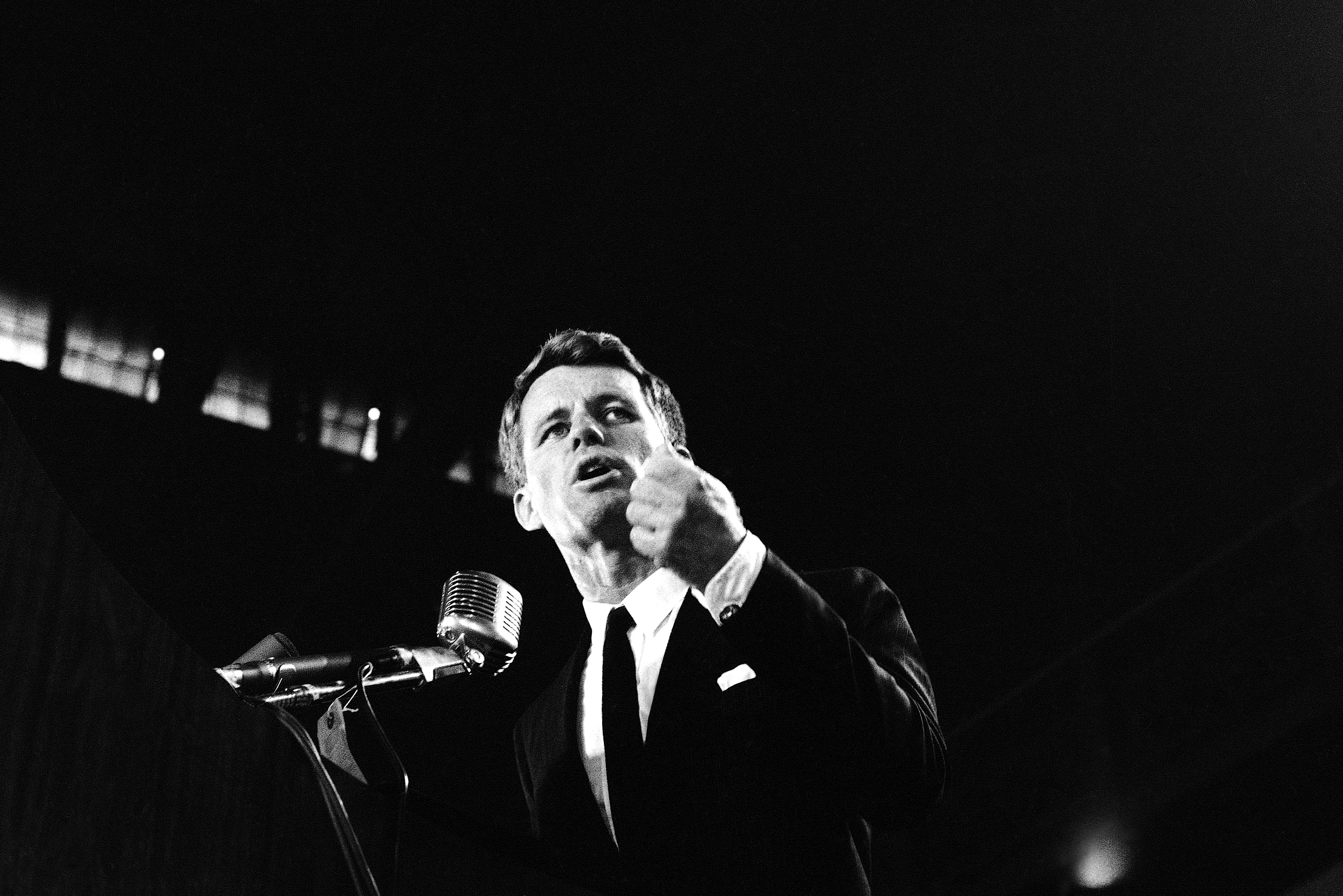What would Bobby do?
Robert F. Kennedy's message still rings true 50 years after his death. Here's why.


A free daily email with the biggest news stories of the day – and the best features from TheWeek.com
You are now subscribed
Your newsletter sign-up was successful
Today is the 50th anniversary of the assassination of liberal icon Robert F. Kennedy, the senator, attorney general, and brother to a murdered president. Decades later, as Democrats seek to forge a winning coalition after their devastating loss in the 2016 election, they should put away the polls and look to the message RFK espoused just before he was killed.
If you had to sum up Kennedy's campaign for president in 1968 in a single word, it would be reconciliation. "At a time when working-class whites and black voters were at each other's throats, Kennedy managed to forge a remarkable coalition by communicating to both groups that he cared about their futures," Richard Kahlenberg, senior fellow at The Century Foundation, says in a report on his ill-fated campaign. "Running as a candidate deeply committed to advancing civil rights, Kennedy nevertheless was able to attract many working-class white voters, some of whom had voted for segregationist George Wallace in a previous election."
Kennedy's popularity among African-Americans, Latinos, college students, and blue-collar white voters can be traced both to his empathy and political courage. Two days after announcing he was running for president, he called for an end to the Vietnam War at the University of Kansas, and three days later spoke in favor of civil rights at the University of Alabama, a bastion of the Old South.
The Week
Escape your echo chamber. Get the facts behind the news, plus analysis from multiple perspectives.

Sign up for The Week's Free Newsletters
From our morning news briefing to a weekly Good News Newsletter, get the best of The Week delivered directly to your inbox.
From our morning news briefing to a weekly Good News Newsletter, get the best of The Week delivered directly to your inbox.
Kennedy believed in persuasion, a lost political art form in our age of micro-targeting and data-driven campaigns. Democrats criticize Hillary Clinton's failure to visit Wisconsin — but RFK wouldn't have just gone to that purple state, he would have gone to West Virginia and Mississippi too. He would have spoken to the voters who hated him most. It's how he won primaries in Nebraska and Indiana (where he was greeted by "HANOI LOVES YOU BOBBY" signs) — by showing up in the smallest of towns and making an effort.
"He went yammering around Indiana about the poor whites of Appalachia and the starving Indians who committed suicide on the reservations and the jobless Negroes in the distant great cities, and half the Hoosiers didn't have any idea what he was talking about; but he plodded ahead stubbornly, making them listen, maybe even making some of them care, by the sheer power of his own caring," Kennedy speechwriter John Bartlow Martin testifies.
Kennedy didn't see rural voters as "deplorables" or the enemy of progressive politics, but as the audience. He built a coalition of minorities and working-class whites because he spoke to them directly, traveling from the slums of New York City to the Mississippi Delta to Pine Ridge to eastern Kentucky.
"His appeal was a liberalism without elitism, and a populism without racism," writes Kahlenberg, who recommends progressives continue fighting for marginalized communities while emphasizing class interests and demonstrating respect for working-class values.
A free daily email with the biggest news stories of the day – and the best features from TheWeek.com
That's what Kennedy did. "He believed in sacrifice, family, community, and love of country," wrote Thurston Clarke in The Last Campaign, a tragic account of Kennedy in the 1968 primaries. RFK mixed his appeals to racial and social justice with a message of patriotism, dignity, and decency that might seem downright conservative to many Democrats today. And he told audiences the opposite of what they wanted to hear.
"Too much and for too long, we seemed to have surrendered personal excellence and community values in the mere accumulation of material things," said Kennedy at the University of Kansas, slamming the GDP as a measure of the nation's progress and taking an unabashedly liberal position on the moral imperative of eradicating poverty.
When Kennedy died, and the funeral train passed from New York to Washington, Clarke says, "the Wallace supporters, Delaware bridesmaids, Gary steelworkers, Nebraska farmers, and Chicano farmworkers mourned him so fiercely because they sensed that he had tried to educate rather than manipulate them, reconcile rather than divide them, engage them in dialogue rather than feed them the message of the day, appeal to their better angels instead of their wallets, and demand sacrifice instead of promising comfort."
That message of shared sacrifice is missing today from American politics. If Democrats hope to take back Congress and the White House, they must make a similar appeal to unite all Americans.
"I think we can do better," Kennedy said often during the campaign, and so should we.
Michael Cooper is a journalist and attorney in North Carolina with contributions to National Affairs, The New Republic, and U.S. News & World Report..
-
 ‘My donation felt like a rejection of the day’s politics’
‘My donation felt like a rejection of the day’s politics’Instant Opinion Opinion, comment and editorials of the day
-
 Trump wants a weaker dollar but economists aren’t so sure
Trump wants a weaker dollar but economists aren’t so sureTalking Points A weaker dollar can make imports more expensive but also boost gold
-
 Political cartoons for February 3
Political cartoons for February 3Cartoons Tuesday’s political cartoons include empty seats, the worst of the worst of bunnies, and more
-
 The billionaires’ wealth tax: a catastrophe for California?
The billionaires’ wealth tax: a catastrophe for California?Talking Point Peter Thiel and Larry Page preparing to change state residency
-
 Bari Weiss’ ‘60 Minutes’ scandal is about more than one report
Bari Weiss’ ‘60 Minutes’ scandal is about more than one reportIN THE SPOTLIGHT By blocking an approved segment on a controversial prison holding US deportees in El Salvador, the editor-in-chief of CBS News has become the main story
-
 Has Zohran Mamdani shown the Democrats how to win again?
Has Zohran Mamdani shown the Democrats how to win again?Today’s Big Question New York City mayoral election touted as victory for left-wing populists but moderate centrist wins elsewhere present more complex path for Democratic Party
-
 Millions turn out for anti-Trump ‘No Kings’ rallies
Millions turn out for anti-Trump ‘No Kings’ ralliesSpeed Read An estimated 7 million people participated, 2 million more than at the first ‘No Kings’ protest in June
-
 Ghislaine Maxwell: angling for a Trump pardon
Ghislaine Maxwell: angling for a Trump pardonTalking Point Convicted sex trafficker's testimony could shed new light on president's links to Jeffrey Epstein
-
 The last words and final moments of 40 presidents
The last words and final moments of 40 presidentsThe Explainer Some are eloquent quotes worthy of the holders of the highest office in the nation, and others... aren't
-
 The JFK files: the truth at last?
The JFK files: the truth at last?In The Spotlight More than 64,000 previously classified documents relating the 1963 assassination of John F. Kennedy have been released by the Trump administration
-
 'Seriously, not literally': how should the world take Donald Trump?
'Seriously, not literally': how should the world take Donald Trump?Today's big question White House rhetoric and reality look likely to become increasingly blurred
